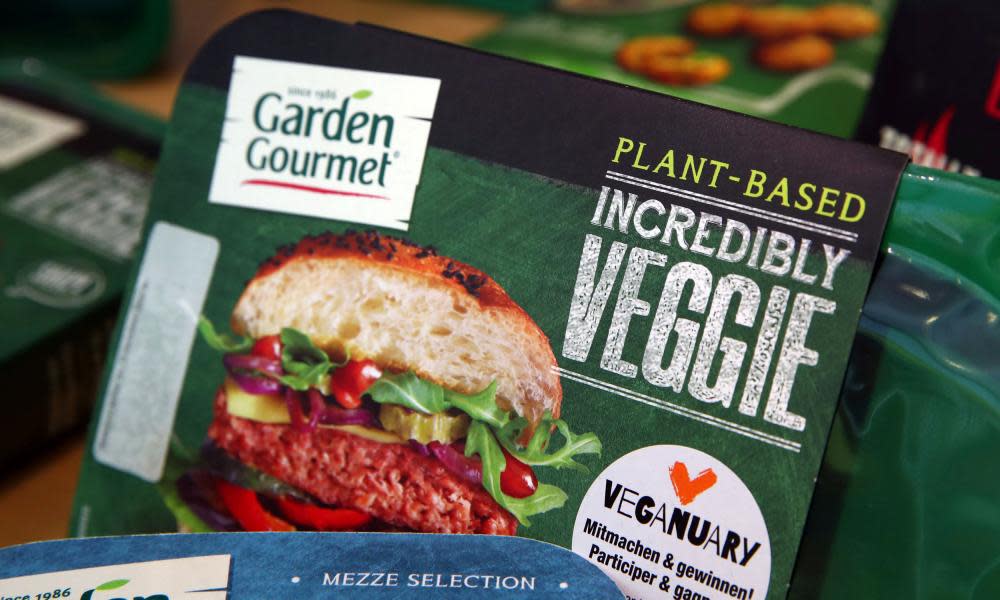Battle over EU ban on ‘veggie burger’ label reaches key vote

The terms “veggie burger” and “veggie sausage” could be banned by the EU next week when the European parliament votes on proposals that would also outlaw descriptions such as “yoghurt-style” and “cheese-like” for plant-based alternatives to dairy products.
Sales of these products are growing fast but farming and meat lobbyists say the terms mislead people and amount to a “cultural hijacking” of the meat industry. Opponents, backed by major food companies including Unilever and Nestle, say the claims of consumer confusion are ridiculous. They say a ban would also contradict the EU’s drive to help consumers choose more sustainable food and cut climate-heating emissions.
The meat lobby’s proposal states: “Names currently used for meat products shall be reserved exclusively for products containing meat [including] steak, sausage, escalope and burger.” A similar ban would apply to plant-based chicken products.
There is already a ban on plant-based alternatives calling themselves milk, cream, butter, cheese or yoghurt. But the second proposal would extend this to outlaw terms likening the products to dairy, such as style, imitation, flavour and substitute.
“This is an obvious case of cultural hijacking,” said Jean-Pierre Fleury, from Copa-Cogeca, the trade body for Europe’s farmers. “Certain marketing agencies are using this to deliberately confuse consumers.”
He said he wanted the work of millions of European farmers and livestock workers to be respected: “We are about to create a brave new world where marketing is disconnected from the real nature of products, which is just asking for things to spin out of control.”
Jasmijn de Boo, from the the food advocacy organisation ProVeg International, said: “This is clearly nonsense. Just as we all know there is no butter in peanut butter, consumers [buying veggie burgers] know exactly what they’re getting. These proposals are in direct contradiction of the EU’s stated objectives in the European Green Deal and Farm to Fork strategy to create healthier and more sustainable food systems.”
David Haines, the chief executive of Upfield, which makes Flora spreads, said: “This is about censorship as it may become impossible to talk about the health and sustainability benefits of plant-based foods versus dairy.”
The heavy environmental footprint of meat and dairy has become clear in a series of scientific studies in recent years showing a huge reduction in meat-eating is essential to avoid climate breakdown.
Related: Why you should go animal-free: 18 arguments for eating meat debunked
The proposals have been put forward by the EU parliament’s agriculture committee and the vote is expected on Tuesday, as part of the chamber’s consideration of the €350bn (£320bn) common agricultural policy. Observers say the result could go either way.
If passed, implementation of the proposals would then be negotiated with the member state governments in the European council, with a final decision potentially coming before the end of the year. Some have suggested that burger and sausage could be replaced by the terms disc and tube.
A specific objection from Copa-Cogeca is “the representation of these ultra-processed [plant-based] products as healthier options, given that they are often high in additives, salt, sugar and fat”.
Opponents of the proposals say people already eat more meat than recommended and that red meat is linked to cancer and heart disease. They also say the livestock industry threatens public health due to the overuse of antibiotics, which is driving resistance, as well as the risk of other diseases.
“Consumers don’t want to buy the nutritional equivalent of a meat burger, they want to buy something better,” said Alex Holst, at the Good Food Institute. He said farmers could capitalise on a burgeoning sector by growing protein crops such as legumes, soy and peas for plant-based meat instead of animal feed.
France, a powerful voice in the EU on farming, backs the proposals and has already implemented bans on veggie burger labelling at home. But the government in the Netherlands has backed the use of such terms, while a satirical Dutch TV show recently created a spoof advert featuring the slogan “You have to murder to call it a burger”.
In the UK, a House of Lords committee expressed its concern in 2019, saying a ban “would in fact reduce consumer clarity” and make it harder for people to eat less meat at a time when the government should be encouraging the opposite. It said fewer than 4% of people had ever bought a vegetarian product unintentionally.
“We are confident, whichever way the vote goes, that the plant-based sector will continue to innovate and thrive,” said De Boo. “There is simply no stopping the global demand for plant-based food, no matter what restrictions are placed in its way.”


